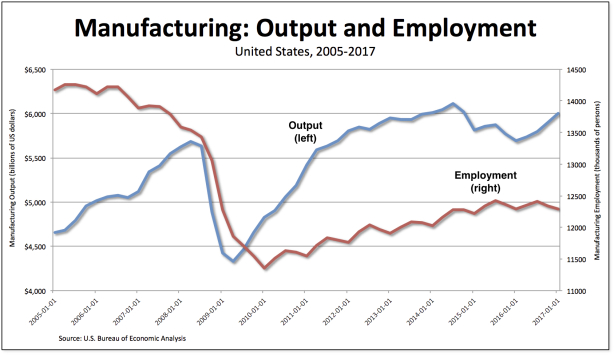From David Ruccio Both Donald Trump and Eduardo Porter would have us believe the U.S. trade deficit is a serious problem—and that, if it can brought back into balance, jobs for American workers will be restored. Nonsense! Yes, I know, Trump’s attacks on free trade did in fact resonate among working-class voters. And, as I have argued, there is clear evidence that that a tiny group at the top has captured most of the benefits of trade agreements and other measures that have allowed U.S. corporations to engage in increased international trade, both importing and exporting commodities that have boosted their bottom-line. It’s possible then to make the case (as I did here) that mainstream economists, in their zeal to push globalization forward, ignored those problems and concerns, thus
Topics:
David F. Ruccio considers the following as important: Uncategorized
This could be interesting, too:
tom writes The Ukraine war and Europe’s deepening march of folly
Stavros Mavroudeas writes CfP of Marxist Macroeconomic Modelling workgroup – 18th WAPE Forum, Istanbul August 6-8, 2025
Lars Pålsson Syll writes The pretence-of-knowledge syndrome
Dean Baker writes Crypto and Donald Trump’s strategic baseball card reserve
from David Ruccio

Both Donald Trump and Eduardo Porter would have us believe the U.S. trade deficit is a serious problem—and that, if it can brought back into balance, jobs for American workers will be restored.
Nonsense!
Yes, I know, Trump’s attacks on free trade did in fact resonate among working-class voters. And, as I have argued, there is clear evidence that that a tiny group at the top has captured most of the benefits of trade agreements and other measures that have allowed U.S. corporations to engage in increased international trade, both importing and exporting commodities that have boosted their bottom-line.
It’s possible then to make the case (as I did here) that mainstream economists, in their zeal to push globalization forward, ignored those problems and concerns, thus paving the way for Trump’s victory—and, at the same time, that the solutions for those real issues will not come from reducing the trade deficit and supporting a renewal of the manufacturing sector.
First, we have to understand, the U.S. trade deficit has risen and U.S. manufacturing output has fallen not because of the “blind forces” of international trade. For decades now, U.S. corporations have decided to increase their profits by a combination of shifting production to other countries and automating many of the production processes that remain in the United States. And they’ve left the American working-class behind.
Second, there’s no guarantee that increasing manufacturing output within the United States will be accompanied by an equivalent number of new jobs. Just look at the chart at the top of the post. Since 2009, U.S. manufacturing output has increased by more than 38 percent but jobs in the manufacturing sector have only risen by 8.2 percent.
The U.S. trade balance is thus not the problem. The forces of U.S. capitalism have sacrificed the American working-class on the altar of higher profits. They did so before Trump was elected—and they’ve continued to do so since.
Let’s see Trump and Porter balance that.
